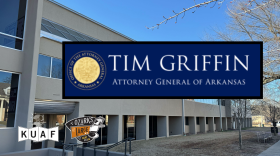Housing solutions are top of mind for the Northwest Arkansas Council. Groundwork is a dedicated extension of the council’s work, focused on keeping the region a place people can afford to build a life and future. That’s also why they host an annual housing summit that brings together public and private leaders to learn from industry experts and collaborate on solutions across city lines.
Isabel Gamarra is the communications director at Groundwork. She says this year’s summit is open to anyone interested in learning more about housing in northwest Arkansas.
Gamarra: But really, we invite anybody within the housing vertical to join us. So elected officials, mayors, developers and anyone in the planning world. But of course, we welcome anyone to our events.
Moore: Tell me a little bit about some of the ideas that are going to be talked about here. What sets this event apart specifically? And who are some of the experts and the areas of expertise that they have?
Gamarra: Sure. So we actually have a packed summit this year. First, we’re going to be inviting Ted Knowlton. He is the chief planner within the Wasatch Front Regional Council in Salt Lake City, Utah. A few years ago, he led a regional growth strategy for a region in Utah. So he’s going to be bringing his best practices on what they did in Utah and how we can implement that on a regional basis here in northwest Arkansas. We know we’re individual cities, but we kind of function as a region. So he’s going to talk about how they developed that project and what are some learnings that we can implement here in northwest Arkansas.
We’re also welcoming Jonathan Kurth. He’s the director of development services at the city of Fayetteville. Ginger Charles is the head of external affairs at Amherst. And then Audra Butler works at Communities Unlimited. They’re going to be talking about modular building as a solution to building housing quicker. They’ll have some really cool examples of what they’re doing across the nation and in Arkansas with modular.
Then we’re also welcoming—we’re going to have a chat session. Basically, Chats is a new program that Groundwork has implemented in our region. It is an opportunity for neighbors to talk about housing with their neighbors. It’s basically like a little game that we do, and everybody who’s attending will participate in a modified version of Chats.
Finally, our last two speakers. Our executive director, Duke McLarty, works for the National Housing Crisis Task Force. So we’re inviting one of their leaders to come join us for an update on what they’re recommending from a national standpoint. And then finally, Mr. Colin Clark, who works for the Bush Institute for Economic Growth. He’s going to talk about a report that he released this summer on housing. So it should be some really great speakers that have some great insights that we can apply locally.
Moore: As I hear you talk about the first speaker in particular, who’s coming from Utah, I think it’s interesting to think about how when we think about northwest Arkansas, we often refer to it regionally as northwest Arkansas and not the specific cities. Because, as you mentioned, the way that we think about housing is different from, say, a singular city with suburbs. Having someone come in who’s done city planning in Chicago or Nashville even may have some worthwhile things, but thinking on a more regional level is probably more effective for our community. I’m sure that plays a role in who you decide to bring in for these sorts of events.
Gamarra: Yeah, absolutely. I think we are both blessed, and it’s kind of a challenge in the sense that we are a polycentric region with more than 20 municipalities of varying sizes, which makes it more difficult to implement brash change because you have to work within each of the municipalities. So bringing in Ted is a great example of how we can work together as municipalities to help address these issues, from infrastructure to housing. We’re really happy to have him. And he can talk about what that process was for them and how we can look to their region, which is very similar to our region probably 15 years ago, and how we can take some of their learnings, good or bad, and implement them here.
Moore: I also think a lot about how we have the larger cities in our region, but we also have places like Centerton and Pea Ridge, these communities on the outskirts of the larger towns that are quickly and rapidly growing. We’re seeing huge population booms in some of these smaller towns nearby. And I have to think that being on the ground as you guys are here can be beneficial at this point in time, because we’re really at an inflection point when it comes to some of these smaller towns growing and making sure the infrastructure is in place to grow sustainably as well.
Gamarra: Agreed. I think a lot of these towns are grappling with that idea of how do they maintain their core identity as they continue to grow. So as this regional plan is in place, I think a lot of the support that you’ll be providing those smaller towns is ways they can continue to be Centerton and Pea Ridge as they were, and then really grapple with the idea of what they want to become as they grow, implementing best practices to sustain the green areas and make sure they’re growing in a sustainable and economically sound manner.
Moore: The last part of your summit here is an optional part, but it’s a tour of Big Emma. Why is that an important element of this summit for you all?
Gamarra: Yeah, sure. Big Emma is Groundwork’s first investment that we made. It was meant to be a project that shows how public-private partnerships can help build affordability into developments. For those who don’t know about Big Emma, it is a new building that is almost at completion on Emma Avenue in Springdale. It’s 70 units, and 30 of those units are going to be reserved for lower income. They will be about 30% less than what market rate would be.
The way that we worked that out is we did an investment, but we also worked with the builder and a nonprofit developer, which is Community Development Northwest Arkansas, to bring this building to light. It’s really just a demonstration on how we can use innovative ideas to infuse some affordability into our developments.
Moore: As you talked about the element—what was the word you used? Poly…
Gamarra: Polycentric.
Moore: Yeah, this polycentric model that we have here in northwest Arkansas, working with multiple municipalities in order to get this sort of work done. It’s a challenge. It’s probably more bureaucratic, but do you hope that it can also be more productive? Because what’s happening in Springdale with Big Emma, for example, can be easily replicated in other municipalities.
Gamarra: Yeah, absolutely. I think that while it may be more difficult in terms of having to work with every single city, our polycentric nature is something that makes us unique and really is a value to our region. Each of our cities has its own unique identity, which I think really helps bring different perspectives into our region. We’ve already seen some cities implement things and then other cities replicate or learn from what those cities have done.
Gamarra: So yeah, definitely whatever we do in one city can serve as a learning experience for other cities. As they work together to figure out how they can work together better, I think these types of examples will show what cities can do to really bring more housing into their municipality.
Isabel Gamarra is the communications director at Groundwork. You can find more details about their annual housing summit coming up in October at Groundwork.
Ozarks at Large transcripts are created on a rush deadline. Copy editors utilize AI tools to review work. KUAF does not publish content created by AI. Please reach out to kuafinfo@uark.edu to report an issue. The audio version is the authoritative record of KUAF programming.








